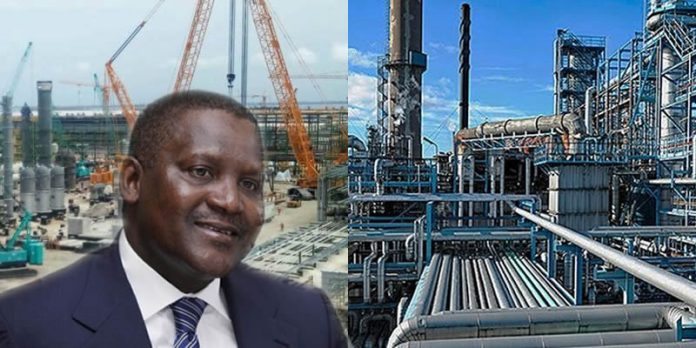Operators of modular refineries in Nigeria have voiced support for Aliko Dangote’s recent revelations regarding the powerful mafias in the oil sector attempting to hinder domestic refining of crude oil. The Crude Oil Refinery Owners Association of Nigeria (CORAN) echoed Dangote’s concerns, emphasizing the detrimental impact of these actions on the nation’s economy.
Dangote, during a speech at the Afreximbank Annual Meetings and AfriCaribbean Trade & Investment Forum in The Bahamas, highlighted the repeated sabotage attempts by local and international cartels aimed at his $19 billion Dangote Petroleum Refinery project. He described these groups as more formidable than drug cartels, revealing that they had even tried to push him into loan defaults during the COVID-19 pandemic to halt the refinery’s progress.
CORAN, representing both modular and conventional refinery operators, reiterated that they have long raised alarms about the mafia’s grip on Nigeria’s oil sector, which has been stifling efforts to achieve self-sufficiency in refining petroleum products. The association’s Publicity Secretary, Eche Idoko, highlighted that these entrenched interests are profiting from the importation of petroleum products, thereby resisting any move towards in-country refining.
The concerns extend beyond just economic sabotage. Idoko pointed out that the rise in food inflation in Nigeria can be partly attributed to the hike in petroleum product prices, which in turn affects transportation and production costs. He criticized the government’s reliance on OPEC standards for crude pricing without making special arrangements for domestic use, unlike other OPEC-member countries.
CORAN urged President Bola Tinubu, who also serves as the Minister of Petroleum, to directly address these issues. The association stressed the need for a clear policy on achieving self-sufficiency in domestic refining and criticized the lack of engagement with stakeholders like themselves.
Dangote’s struggles are mirrored by the broader challenges faced by modular refinery operators. Despite Nigeria’s status as Africa’s largest crude oil producer, domestic refiners struggle to secure crude oil due to the export-focused policies and the dominance of international oil companies (IOCs). The financing for about 20 modular refineries has been stalled as international financiers demand guarantees of crude supply, which the Nigerian government has yet to secure from IOCs.
Currently, Nigeria has 25 licensed modular refineries, with only five operational. The others face significant delays due to the unavailability of crude oil, stalling funding from financiers. This issue highlights the broader systemic problems within Nigeria’s oil sector, which need urgent government intervention to resolve.
In response to these challenges, the Nigerian Upstream Petroleum Regulatory Commission (NUPRC) stated it cannot guarantee crude supply to refineries that are not yet operational. NUPRC’s CEO, Gbenga Komolafe, emphasized that refining is a commercial venture and the commission’s role is to ensure compliance with the Petroleum Industry Act (PIA) provisions regarding domestic crude oil supply obligations.
CORAN and other stakeholders call for a definitive government stance and proactive measures to ensure consistent crude supply to domestic refineries. This step is crucial for reducing dependency on imported petroleum products, stabilizing the market, and ultimately, alleviating the economic burden on Nigerian citizens.
This situation underscores the need for structural reforms and stronger regulatory frameworks to support the growth of domestic refining capacity and to curb the influence of powerful interest groups in the oil sector.













